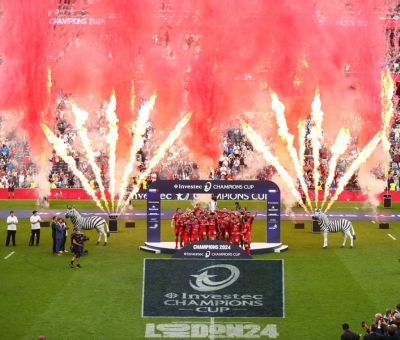FEI President Ingmar De Vos welcomed 270 delegates to the FEI Sports Forum 2015 yesterday, held at the prestigious business school IMD in Lausanne, Switzerland. The Forum’s first session was dedicated to the FEI World Equestrian Games™, with the objective of turning the microscope on the FEI’s flagship event and outlining potential changes to the FEI disciplines and competition formats in order to increase the interest of future bid cities, the public, media and broadcasters.
Tim Hadaway, FEI Director of Games and Championships, highlighted the magnitude of the Alltech FEI World Equestrian Games™ 2014 in Normandy, which were the biggest in the event’s 25-year history. 74 nations were represented, a record 28% increase on previous editions, with more than 900 athletes and 1,000 horses competing at the five venues across the Normandy region. Almost 575,000 tickets were sold, another record for the Games, and the event generated an estimated economic impact of €190 million for Normandy and €368 million for France.
Matthew Wilson, Director of Consulting at The Sports Consultancy, then presented the outcome of a detailed strategic review of the FEI World Equestrian Games™ put in place by the FEI prior to Normandy. The Sports Consultancy had conducted a proactive review to understand how this flagship event could be re-aligned to meet its original objectives and to help equestrian sport continue to grow.
The outcome of this consultation process was clear: 97% of consultees were in agreement that the Games should remain as the pinnacle of the equestrian calendar, and 83% of consultees wanted to maintain all eight disciplines at the Games. It had become clear however that there was a strong appetite for change. The FEI’s main challenge was to ensure that the event could be delivered sustainably and continue to thrive.
A key finding of The Sports Consultancy’s study was that the budget of the 2014 edition was considered by many to be exceptionally large, and required extensive investment from the public sector. Only very few nations could afford to host such an expensive and complex event.
The following key conclusions from The Sports Consultancy’s report were highlighted:
- Reduction in the size of the competitor field;
- Reduction in length of the event, nine to 10 days, including two weekends, was deemed the optimal length. The current format was deemed too long to sustain media and spectator interest;
- Re-design of the competition formats and schedule to encourage a more compact foot print;
- Development and implementation of industry leading sport presentation concepts that deliver to the non-equestrian fan needs.
Wilson concluded by outlining the clear strategic objectives the FEI should use as guidance through the proposed changes. The Games must remain differentiated from other FEI events and remain a pinnacle of the equestrian calendar; they must help grow the sport and assist with delivering the global appeal required for Olympic status; the budget for hosting the Games needs to be as attractive as possible to hosts and carry a lower financial and delivery risk; the public sector investment must be achievable for a greater number of prospective hosts through delivery of a significantly improved return on investment; the Games must be commercially effective for the FEI; and the Games must be accessible for and attractive to spectators both on venue and via broadcast to increase the stakeholder experience.


